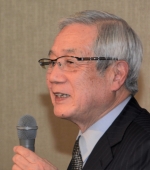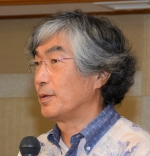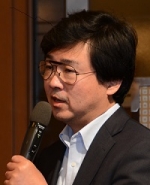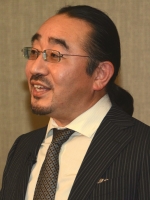December 22, 2017
The 144th
"From Genome Sequencing to Genome Editing—Will Genomic Science Open Paths for the Future of Mankind?"
December 5, 2017 at Courtyard by Marriott Tokyo Ginza Hotel
The Human Genome Project, the international project that involved scientists around the world, completed the sequencing of the human genome in 2003. Having played a central role in the project and served as chairman of the Human Genome Organization (HUGO) and other important posts, Dr. Sakaki is Japan's top authority on genomic research. He attributes their success in sequencing all three billion base pairs of the human genome at an early stage to three key factors. The first is advances in engineering with the development of the automated DNA sequencer (automatically reads the DNA base sequences), which accelerated analysis work dramatically. The second is the introduction of the open innovation policy that recognized the human genome as property to be shared by all of mankind and enabled everyone to share data. The third is the rise of an academic discipline that involved not only bioscience researchers but also included technical engineering staffers as well. In particular, advances in bioinformatics led to advances in computer performance and to the development of technologies that enabled mass data processing and analysis. Genomic science is making great advances today. Genome editing that can be executed rather easily is an innovation that holds the promise of curing diseases for which fundamental therapeutic methods have yet to be found, as well as various other possibilities for drug creation, agriculture, fisheries, etc. While expressing hope for advances that will make genomic science "a powerful weapon that can contribute to averting human crises," he also pointed out the possibility of it "becoming a weapon that can destroy mankind" and urged "the necessity for social debate on handling the technology."
Dr. Yoshiyuki Sakaki
Professor Emeritus, The University of Tokyo
Lecture record
September 19, 2017
The 143rd
"The Current State of AI Research and Social Design"
September 19, 2017 at Courtyard by Marriott Tokyo Ginza Hotel
Because of the large number of moves involved in the game of Go compared to chess and shogi, it was believed difficult for a computer to triumph over a human in playing Go. However, the news of artificial intelligence (AI) beating a world-class Go master took many people by surprise. With the dramatic advances achieved in AI today, this has drawn great interest as an important technology—alongside the IoT that connects all devices and appliances to the Web—that will bring dramatic changes in how society will operate in the future.
As a top authority in AI in Japan, Dr. Nakashima pointed out that AI is not being understood correctly today and defined AI as part of information technology (IT) and intelligence as "the capability to process information appropriately even when there is a shortage of information." In the course of his explanation on how AI will be utilized when necessary information remains incomplete, Dr. Nakashima presented as an example of an AI application the Smart Access Vehicle (SAV), the AI-based, fully automated vehicle distribution system that combines public transit buses and taxicabs. It is a scheme in which optimal public transit vehicle distribution is determined on a real-time basis, in relation to driving distance and passenger waiting time.
In response to concerns that AI may rob humans of jobs, Dr. Nakashima stated that "AI is able to acquire specialized knowledge but cannot design society. Human jobs will be founded on creativity in the future."
Dr. Hideyuki Nakashima
Project Professor, Chair for Frontier AI Education, The University of Tokyo
Lecture record
June 19, 2017
The 142nd
"Development and Certification of the HondaJet"
June 19, 2017 at Hoteru Okura Tokyo
Honda Motor began developing aircraft in 1986. Mr. Fujino was a member of the team from the start of the project and is the father of the HondaJet, the advanced light jet. Light business jets were used for their convenience but suffered from problems such as slow cruising speed, a small cabin and luggage space, and loud cabin noise. With the HondaJet's innovative design, which places the engine above the main wings, it achieves higher altitudes and a higher cruising speed, a wider cabin and more luggage space, and reduced cabin noise. It now enjoys more than a 50% share in this category. This time, Mr. Fujino presented the full range of activities that were conducted, from research into the elemental technologies and technological development to ground testing, performance verification with a prototype model and acquisition of a type certificate for mass production. He explained that the most important factor in aircraft development is to prove that all the aerodynamic features are reproduced as planned in the design and to determine correctly what behavior occurs under what conditions. Mass production is not possible until these assessments have been completed. It was also necessary to obtain a type certification from the United States Federal Aviation Administration (FAA) before manufacturing and marketing the HondaJet as a production model. When he said that this required "three thousand hours in test flights and more than 2.4 million pages of documentation to be submitted to the FAA," a voice of surprise and admiration rose from the audience.
Dr. Michimasa Fujino
President & CEO, Honda Aircraft Company
Lecture record
March 02, 2017
The 141st
"A Heretic, Once Recognized, Becomes an Innovator —From Basic Research to Innovation: Creating a Bio-Venture That is the First of its Kind in Japan"
March 2, 2017 at Courtyard by Marriott Tokyo Ginza Hotel
Many of the drugs we use have been made with small molecules. While they excel for use as medicine for their low cost, enabling mass production, they present difficulty in identifying the focus of the disease with pinpoint accuracy, as well as side effects. The vast majority of the drugs created in recent years use antibodies, which minimize side effects and are effective on specific targets but involve huge investment in time and cost for development and manufacturing, as well as reliance on accidental discoveries.
Dr. Suga studied peptides that are found in the human body as the source of drug discovery. He developed technology that can generate highly diverse peptide libraries that number from several hundreds of billion to trillions with chemical synthesis in test tubes and technology enabling precise combinations of the substances so created for use in drug discovery.
In his conviction that "the social mission of a researchers is to reimburse society with innovation and technology," Dr. Suga established his company PeptiDream Inc. and commenced licensing of his non-standard peptide libraries to pharmaceutical companies around the world. In addition to success in building a venture business, he realized his dream of helping patients battling disease through drug discovery.
He pursued research under his slogan that "a heretic, once recognized, becomes an innovator." He foresees drug discover that can cure cancer and dementia in the future and stirred great hope among the participants.
Dr. Hiroaki Suga
Professor, Graduate School of Science, The University of Tokyo
Lecture record










